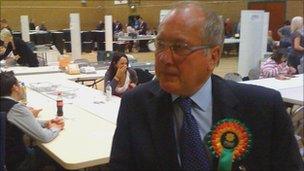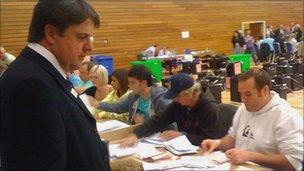Vote 2011: Llanelli win boost for Welsh Labour
- Published
Labour's hopes of outright control of the Welsh assembly are still alive after winning back both Llanelli and Blaenau Gwent.
Plaid Cymru suffered a major blow as its deputy leader Helen Mary Jones was defeated by Keith Davies in Llanelli.
It came after Alun Davies triumphed in the valley seat of Blaenau Gwent.
Liberal Democrats suffered a major blow when they lost Montgomeryshire to the Conservatives.
Labour, which has also held Islwyn, Merthyr and Pontypridd, Newport East and Newport West, needs 31 seats for an outright majority, which would mean it could govern alone.
Keith Davies, speaking in Welsh in his acceptance speech, called himself a socialist, a nationalist and a Welshman and said he was "looking forward to working hard for Wales and Llanelli".
The Llanelli result means Plaid deputy leader Helen Mary Jones is out of the assembly for the first time since it was founded in 1999.

Welsh Labour leader and First Minister Carwyn Jones at the count in Bridgend
She said: "We have been in this place before in this hall, and had come back. We will again."
Former prominent Plaid Cymru campaigner Sian Caiach, standing as an independent in Llanelli, polled more than 2,000 votes which might have gone to Plaid, said political commentator Dr Richard Wyn Jones.
Plaid MP Jonathan Edwards called Ms Jones's defeat a big loss to the assembly, and he was surprised at the amount of votes Ms Caiach polled.
Tory Russell George took Montgomeryshire from the Lib Dems. The seat was won in 2007 by then Lib Dem candidate Mick Bates, who later left the party after being convicted for drunkenly attacking a paramedic.
Lib Dem-held Cardiff Central is said to be too close to call, and there is speculation the Conservatives may lose Cardiff North to Labour.
But Tories hope they could become the second biggest party, while the Greens and UKIP predict they may win their first seats, and both Plaid Cymru and Liberal Democrats fear they will suffer losses.
In the last assembly, Labour held 26 seats, Plaid 14, Tories 13, Lib Dems six, and one independent.
Before the first results were in, Labour sources said it would be "incredibly tough" to win an outright majority.
First Minister Carwyn Jones would not speculate on another coalition if Labour failed to get an outright majority, but he did rule out "getting into bed with the Tories".
He added: "What I'd like of course is a functioning, arithmetical majority".
Meanwhile, the Conservatives are waiting to see if they can exceed the 12 seats they won in 2007.
UKIP, which returned its first Welsh MEP at the last European election, said it was confident it would break new ground by taking one of the four regional seats in South Wales East.
David Rowland, the UKIP candidate at the top of the South Wales East list, said there was "utter dissatisfaction with the way the assembly has performed over recent years".
"We've been fighting on the failure of the assembly rather than Europe and immigration but people keep coming back to us about these issues... and the failure of the assembly to deal with them," added Mr Rowland.
Green Party officials said they were "quietly confident" of their first AM, and are targeting 7% of the vote in the South Wales Central region, to elect their Welsh leader Jake Griffiths.
Plaid, however, looks set to shed votes and seats. Party sources admitted it was a difficult campaign on the doorstep and they were "not expecting any gains".

Former Labour Welsh Secretary Ron Davies is now Plaid Cymru's Caerphilly candidate
Plaid leader Ieuan Wyn Jones, said he was very proud of his party's performance in the last assembly government, when it was in coalition with Labour.
But he said he found it "inconceivable" that his party would go into coalition with either the Lib Dems or the Conservatives.
He refused to be drawn on whether he would face a leadership challenge if the party registers poor results in this election.
Ron Davies, the former Labour Welsh Secretary who was in Tony Blair's first cabinet, and is now the Plaid Cymru Caerphilly candidate, said people wanted to send a message to Tories in Westminster and thought the best way to do that was through Labour.
He found it "profoundly depressing" that people were not voting on Welsh issues, adding: "It's very sad, it undermines the whole point of devolution."
Tactical voting
Sources said the Lib Dems were "in freefall" in Swansea and Gower. They have had six AMs in each of the first three assemblies, but now look set to lose Montgomeryshire.

Nick Griffin, leader of the British National Party, at the count in Swansea
Party leader Kirsty Williams faced a strong challenge from the Conservatives in Brecon and Radnor, but Tory candidate Chris Davies in Brecon said while it was a close run thing, he thought his Lib Dem opponent had won.
Meanwhile, BNP officials in Swansea East said they had a "fabulous response" to their campaigning, and were "very optimistic". Nick Griffin, the leader of the BNP, who lives near Welshpool, Powys, is at the count.
While the first assembly election result was announced in the early hours of Friday, counting of votes cast in north Wales will not begin until later.
As well as assembly seats, people have also voted on whether to replace the first-past-the-post system for electing Westminster MPs with the alternative vote (AV). Counting will start in the AV referendum at 1600 BST on Friday.